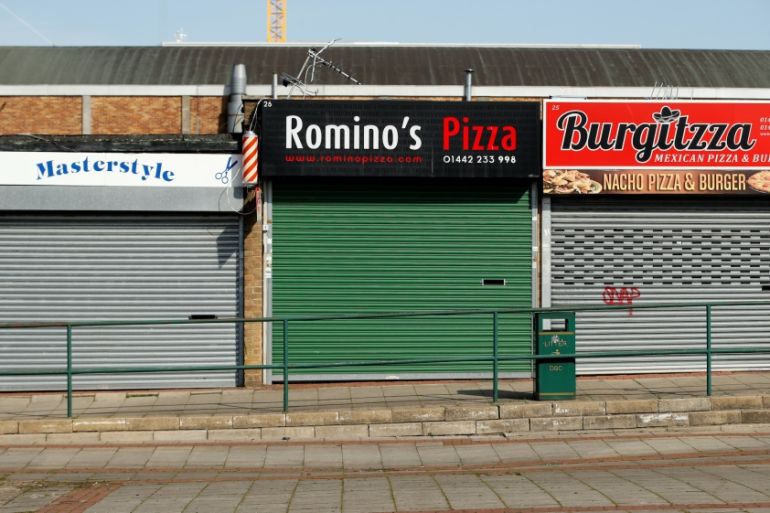UK shopping trips plummet, housing market freezes after lockdown
UK government launches $1.6bn fund to protect high-growth, innovative companies from coronavirus’s economic fallout.

The number of British people leaving their homes to go shopping has slumped by 83 percent since the government closed non-essential retail outlets last month to slow the spread of COVID-19, the British Retail Consortium (BRC) trade body said on Monday.
Separately, property website Rightmove said it was unable to provide meaningful house price data due to a collapse in the number of new homes being listed for sale.
Keep reading
list of 3 itemsEastern Europeans flown in for ‘vital’ jobs on UK, German farms
UK coronavirus toll could be far higher than previously shown
Last week the BRC said retail spending had fallen by more than a quarter in the same period compared with a year ago and Monday’s figures show the decline in the number of people going out has been even sharper.
“Footfall dropped in early March, as many people chose to stay at home and reduce the risk of catching coronavirus,” BRC chief executive Helen Dickinson said.
“This downwards trajectory was accelerated by the government’s decision to put the UK on lockdown.”
Last week, Britain’s budget forecasters said the economy could shrink by an unprecedented 35 percent in the second quarter of 2020 if it was on lockdown for the next three months.
Supermarkets and other retailers of food and essential goods are still open, and the BRC said convenience stores had recorded increased traffic since the lockdown started on March 23.
Rightmove – which typically advertises more than 90 percent of houses for sale on behalf of British estate agents – said there had been an “abrupt turnaround” from the best start to a year since 2016 to new sales now being almost impossible.
“You do not have a functioning market when buyers can’t buy and sellers can’t sell, and so the focus needs to be on what is required to help the market recover once the lockdown can safely be eased,” the company said.
Visits to Rightmove’s website fell by about 40 percent at the time of the lockdown announcement but had started to recover slowly over the past week, it said.
For the “daily dwindling number” of properties put up for sale between March 8, before the lockdown began, and April 11, average asking prices were 2.1 percent higher than the same period in 2019, it added.
Britain’s Royal Institution of Chartered Surveyors warned on April 9 that the property market was coming to a “near standstill” and it predicted a record drop in sales.
Protecting innovative firms
Meanwhile, British finance minister Rishi Sunak launched a new scheme on Monday to protect fast-growing and innovative companies from the economic fallout caused by the coronavirus pandemic.
The 1.25 billion pound ($1.6bn) package comprises a 500 million pound ($624m) fund for high-growth companies and separate support totalling 750 million pounds ($936m) for companies involved in research and development.
The British government has been scrambling to upgrade its measures to reduce the scale of the damage to the world’s fifth-largest economy.
A survey last week from the Office for National Statistics showed that 25 percent of businesses had paused trading since the lockdown.
“This new, world-leading fund will mean (companies) can access the capital they need at this difficult time, ensuring dynamic, fast-growing firms across all sectors will be able to continue to create new ideas and spread prosperity,” Sunak said in a statement.
The support for companies involved in research comprises loans and grants from Innovate UK, Britain’s innovation agency, the finance ministry said. The first payments will be made by mid-May.